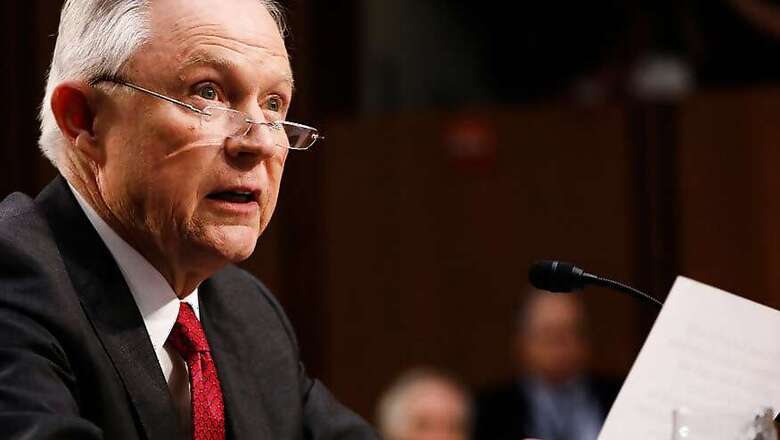
views
Washington: US Attorney General Jeff Sessions on Tuesday denounced as a "detestable lie" the idea he colluded with Russian meddling in the 2016 presidential election, and he clashed with Democratic lawmakers over his refusal to detail his conversations with President Donald Trump.
Sessions, a senior member of Trump's Cabinet and an adviser to his election team, had a series of tense exchanges with Democrats on the Senate Intelligence Committee during about 2-1/2 hours of high-stakes testimony as they pressed him to recount discussions with the Republican president.
"You raised your right hand here today and said you would solemnly swear to tell the truth, the whole truth and nothing but the truth," Democratic Senator Martin Heinrich said. "Now you're not answering questions. You're impeding this investigation."
Sessions refused to say whether he and Trump discussed FBI director James Comey's handling of an investigation into possible coordination between Trump's campaign and Russia during the election campaign before the president fired Comey on May 9.
He declined to say whether Trump expressed concern over Sessions' decision in March to recuse himself from the Russia investigation, and he refused to say if Justice Department officials discussed possible presidential pardons of individuals being looked at in the probe.
Democratic Senator Ron Wyden told Sessions, "I believe the American people have had it with stonewalling. Americans don't want to hear that answers to relevant questions are privileged."
"I am not stonewalling," Sessions replied, saying he was simply following Justice Department policy not to discuss confidential communications with the president.
Sessions' testimony did not provide damaging new information on any Trump campaign ties with Russia or on Comey's firing, but his refusal to discuss conversations with Trump raised fresh questions about whether the White House has something to hide.
Last week, Comey told the same Senate committee that Trump had fired him to undermine the FBI's investigation of the Russia matter.
Sessions had recommended that Comey be fired, and Trump's decision prompted critics to charge that the president was trying to interfere with a criminal investigation. Sessions on Tuesday defended his involvement in Comey's firing despite recusing himself from the Russia probe.
Senator Angus King, an independent, questioned Sessions' legal basis for refusing to answer questions after Sessions said Trump had not invoked executive privilege regarding the conversations.
Executive privilege is a power that can be claimed by a president or senior executive branch officials to withhold information from Congress or the courts to protect the executive branch decision-making process.
Sessions said it would be "inappropriate" for him to reveal private conversations with Trump when the president "has not had a full opportunity to review the questions and to make a decision on whether or not to approve such an answer."
'APPALLING AND DETESTABLE LIE'
Sessions' clash with the Democratic senators was the latest chapter in a saga that has dogged Trump's first five months as president and distracted from his domestic policy agenda including major healthcare and tax cut initiatives.
"The suggestion that I participated in any collusion or that I was aware of any collusion with the Russian government to hurt this country, which I have served with honour for over 35 years, or to undermine the integrity of our democratic process, is an appalling and detestable lie," Sessions said.
"I have never met with or had any conversation with any Russians or any foreign officials concerning any type of interference with any campaign or election in the United States. Further, I have no knowledge of any such conversations by anyone connected with the Trump campaign."
US intelligence agencies concluded in a report released in January that Russian President Vladimir Putin ordered an effort to interfere in the election to help Trump in part by hacking and releasing damaging emails about Democratic candidate Hillary Clinton.
Russia has denied any such interference, and Trump has denied any collusion by his campaign with Moscow.
Sessions recused himself from the Russia investigation in March after revelations that he had failed to disclose two meetings last year with Russia's ambassador to Washington, Sergei Kislyak.
In his testimony on Tuesday, Sessions addressed media reports that he may have had a third previously undisclosed meeting with Kislyak at Washington's Mayflower Hotel last year.
Sessions said he did not have any private meetings and could not recall any conversations with any Russian officials at the hotel but did not rule out that a "brief interaction" with Kislyak may have occurred there.
Sessions, a Republican former senator, was an early supporter of Trump's presidential campaign. But there has been tension between the two men in recent weeks because Trump was annoyed that Sessions recused himself from the Russia probe.
Sessions said on Tuesday he did not recuse himself because he felt he was a subject of the investigation himself but rather because he felt he was required to by Justice Department rules.

















Comments
0 comment